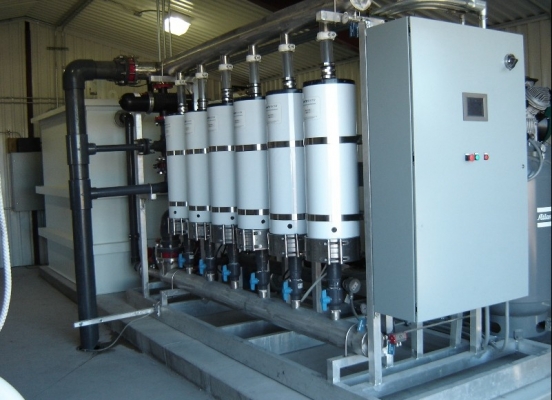Ultrafiltration Plant
Kelvin Water Technologies is a leading name in the field of offering Ultrafiltration plants. These systems offer tangential flow pressure-driven filtration processes that help in efficiently separating particles on basis of their molecular sizes. With pore diameters of ultrafiltration membranes being in the range of 10 to 200 A, solvents and species that have diameters smaller than the pore size of membrane passes through the membrane and emerge as ultrafiltrate (permeate). The particles that are rejected are progressively concentrated in the retained stream.
We offer Ultrafiltration Plants that are reusable and cleanable with standard chemicals and are designed using advanced process technology with the purpose of removing micro bacterial counts. These Ultrafiltration Control Systems act as advanced Industrial Filtration System and find application as a pre-treatment step to the next in step reverse osmosis process.
Membrane Technology
Ultrafiltration is used for the separation of suspended solids, colloids, bacteria, and viruses. This technique uses membranes with pore sizes between 1-100nm.
| TECHNIQUE | MWCO* (Da) |
|---|---|
| Microfiltration | >105 |
| Ultrafiltration | 103-105 |
| Nanofiltration | 102-104 |
| Reverse osmosis | 102 |
As the difficulty has been arising in the continuous removal of tiny particles using a conventional water treatment, and increased concerns about chlorine-resistant organisms, ultrafiltration is gaining popularity and becoming the preferred method of choice for municipal water treatment plants.
Ultrafiltration is very effective at removing very small particles which can quickly foul reverse osmosis membranes, and then resulting in reducing the silt density index of the water. For this reason, it frequently serves as pre-treatment for surface water, seawater, and biologically treated municipal water upstream of RO.
In ultrafiltration, the water flow is directed through a membrane in a cross-flow direction, and a portion of input water flows across the surface of the membrane at a precise rate of flow and pressure. This allows most contaminant stuff to be removed, but also allows the membrane surface to stay clean, and eliminating the fouling that can leave other systems ineffective until manual cleaning occurs.
UF is particularly meant and effective for discarding the colloid (emulsion). It is an effective pre-treatment to Reverse Osmosis used in desalination. It can also be used as a pre-treatment for water that will go through a reverse osmosis system. Water that has been through the ultra-filtration process can also be used as drinkable water in hotels, resorts, recreational centers, and the like.
The following applications use the contaminant-free water resulting from the ultra-filtration process: These include –
- Private Water Supplies
- Engineering Activities
- Bood Processing
- Brewing and Distillery, etc
Applications
The ultrafiltration process removes the highest sensitivity of conventional plant treatment steps of coagulation, sedimentation, and filtration to variable influent turbidity and particle charges.UF is also taken into use by industries to separate suspended solids from solution. Industrial applications include power generation, food and beverage processing, pharmaceutical production, biotechnology, and semiconductor manufacturing. Examples of industrial applications include:
- Washwaters – Tramp Oils, Alkaline & Acidic Washwaters
- Stamping – Heavily Fortified Stamping Fluids & Washwaters
- Transportation – Oily Water from Vehicle Discharge
- Machining and Grinding – Water Soluble and Synthetic Coolants
- Die Casting – Mould Release Fluids & Washwaters
- Vibratory Deburring – Oil and Solid Laden Deburring Liquids
- Primary Metals – Rolling & Drawing Fluid, Coolants
How UF Works?
Empty/hollow fibers of membrane material are used in ultrafiltration and the feed water flows either inside the shell or in the lumen of the fibers. What is retained is the suspended solids and particles of high molecular weight, on the other hand, water and low molecular weight solutes pass through the membrane. Ultrafiltration is somewhat similar to reverse osmosis, microfiltration, or nanofiltration, except in terms of the molecule size it retains. When comparing and strategically combining with other purification technologies in a complete water system, UF is ideal for the removal of colloids, proteins, bacteria, pyrogens, proteins, and macromolecules larger than the membrane pore size from water.
To know more, please check Kelvin Water Technologies.

